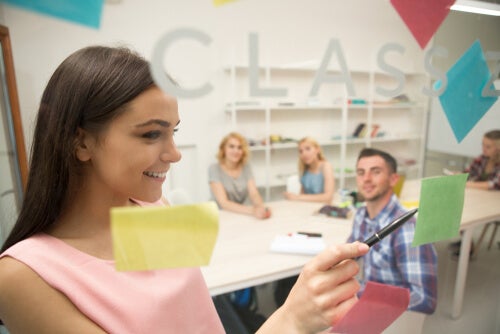The Two Areas of Sexology

Sexology is a science that studies sex from different angles, taking into account behavior, identity, sexual orientation, and interaction. These are some of the aspects that a sexology professional has trained in, with the aim of helping solve problems that may be limiting or generating discomfort in a person’s sexuality. But why don’t people talk about this subject so much and what are the two areas of sexology?
The article “Sexology Based on Evidence: History and Today” answers this question in a clear and concise way: “Sexology is an area of awkward knowledge that has to fight against society’s prejudices, stereotypes, and customs”. Preconceived ideas create great ignorance regarding what’s sexually healthy and this can raise doubts about when to go and see a sexologist.

Areas of sexology: Clinical sexology
Within the areas of sexology, we can differentiate two branches. One of them is clinical sexology, also known as therapeutic sexology. But what’s it all about? What does the person who specializes in it actually do? Well, a clinical sexologist has the task of treating sexual problems and disorders.
Although sometimes it’s difficult to tell, sexual dysfunctions often have psychological causes. Here are some of the dysfunctions that you may be suffering from, but would never think of going to a sexologist to solve them.
- Vaginismus. This is a dysfunction characterized by the involuntary contraction of the vaginal muscles. This prevents penetration and causes painful sexual intercourse. It may be caused by fear, traumatic sexual experiences, or many other reasons.
- Lack of sexual desire. This can be problematic for the couple’s relationship, but it can be resolved in a sexologist’s office. This expert will provide tools to reawaken desire, enjoy erotic stimuli, and overcome laziness and avoidance.
- Erection problems. This well-known problem can cause frustration, fear of re-occurrence, and also a fear of not “measuring up”. It’s quite natural for a man to have occasional erection problems. However, if the problem starts to happen frequently, then maybe the man is too over-demanding or anxious that it’ll happen again and again. Just by thinking it, it probably will happen again. A lot of it lies in the mind. As a result, the man’s self-esteem will suffer considerably.
Educational sexology
Perhaps we now have an idea of what sexology is all about by reading about clinical sexology. But are there any other areas of sexology we should be considering at this point?
What’s educational sexology?
More commonly known as sex education, educational sexology is responsible for offering help and information in colleges and high chools. We’ve named it educational sexology in order to differentiate it from the stereotypical lessons our children often receive.
Actually, as a general rule, the general approach of these talks isn’t strictly educational. The idea is for it to simply transmit information about sexual health.
Although educational sexology also covers dysfunctions and how to prevent sexual diseases, it also deals with topics that are very rarely spoken about, such as:
- The biological, psychological, and social components of sexuality.
- Reproductive health and responsible procreation.
- Disabled people and sexuality.
- Abuse and violence.
- Addictions and sexuality.
- False beliefs and myths.
- Sexual orientation.

Hope for the future
These are just some of the issues that educational sexology addresses. Its aim, therefore, is to promote healthy attitudes and behaviors in order to enjoy our sexuality in a responsible way. Unfortunately, these issues that should be paramount in any school often aren’t even mentioned.
The sexual education that most of us receive often only teaches us about the different contraceptive methods and how to avoid sexual diseases. However, as we’ve seen, it all goes much further than that. Thankfully, it seems that the much-needed change is, indeed, starting to take place.
Sexology is a science that studies sex from different angles, taking into account behavior, identity, sexual orientation, and interaction. These are some of the aspects that a sexology professional has trained in, with the aim of helping solve problems that may be limiting or generating discomfort in a person’s sexuality. But why don’t people talk about this subject so much and what are the two areas of sexology?
The article “Sexology Based on Evidence: History and Today” answers this question in a clear and concise way: “Sexology is an area of awkward knowledge that has to fight against society’s prejudices, stereotypes, and customs”. Preconceived ideas create great ignorance regarding what’s sexually healthy and this can raise doubts about when to go and see a sexologist.

Areas of sexology: Clinical sexology
Within the areas of sexology, we can differentiate two branches. One of them is clinical sexology, also known as therapeutic sexology. But what’s it all about? What does the person who specializes in it actually do? Well, a clinical sexologist has the task of treating sexual problems and disorders.
Although sometimes it’s difficult to tell, sexual dysfunctions often have psychological causes. Here are some of the dysfunctions that you may be suffering from, but would never think of going to a sexologist to solve them.
- Vaginismus. This is a dysfunction characterized by the involuntary contraction of the vaginal muscles. This prevents penetration and causes painful sexual intercourse. It may be caused by fear, traumatic sexual experiences, or many other reasons.
- Lack of sexual desire. This can be problematic for the couple’s relationship, but it can be resolved in a sexologist’s office. This expert will provide tools to reawaken desire, enjoy erotic stimuli, and overcome laziness and avoidance.
- Erection problems. This well-known problem can cause frustration, fear of re-occurrence, and also a fear of not “measuring up”. It’s quite natural for a man to have occasional erection problems. However, if the problem starts to happen frequently, then maybe the man is too over-demanding or anxious that it’ll happen again and again. Just by thinking it, it probably will happen again. A lot of it lies in the mind. As a result, the man’s self-esteem will suffer considerably.
Educational sexology
Perhaps we now have an idea of what sexology is all about by reading about clinical sexology. But are there any other areas of sexology we should be considering at this point?
What’s educational sexology?
More commonly known as sex education, educational sexology is responsible for offering help and information in colleges and high chools. We’ve named it educational sexology in order to differentiate it from the stereotypical lessons our children often receive.
Actually, as a general rule, the general approach of these talks isn’t strictly educational. The idea is for it to simply transmit information about sexual health.
Although educational sexology also covers dysfunctions and how to prevent sexual diseases, it also deals with topics that are very rarely spoken about, such as:
- The biological, psychological, and social components of sexuality.
- Reproductive health and responsible procreation.
- Disabled people and sexuality.
- Abuse and violence.
- Addictions and sexuality.
- False beliefs and myths.
- Sexual orientation.

Hope for the future
These are just some of the issues that educational sexology addresses. Its aim, therefore, is to promote healthy attitudes and behaviors in order to enjoy our sexuality in a responsible way. Unfortunately, these issues that should be paramount in any school often aren’t even mentioned.
The sexual education that most of us receive often only teaches us about the different contraceptive methods and how to avoid sexual diseases. However, as we’ve seen, it all goes much further than that. Thankfully, it seems that the much-needed change is, indeed, starting to take place.
All cited sources were thoroughly reviewed by our team to ensure their quality, reliability, currency, and validity. The bibliography of this article was considered reliable and of academic or scientific accuracy.
- Frago, S., & Sáez, S. Sexología y educación sexual. El sexó-logo hoy. http://ow.ly/4se230nK9NS
- OLIVARES CRESPO, M., & FERNÁNDEZ-VELASCO, R. (2003). Tratamiento cognitivo-conductual de un caso de vaginismo y fobia a la exploración ginecológica. Clínica y Salud, 14 (1), 67-99.
- Sánchez, F. L. (2010). Estudios sobre sexualidad en España: presente y futuro. Informació psicològica, (100), 84-90.
This text is provided for informational purposes only and does not replace consultation with a professional. If in doubt, consult your specialist.







